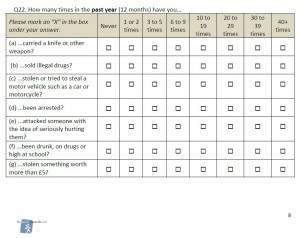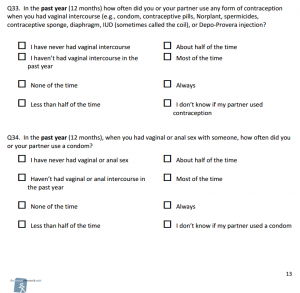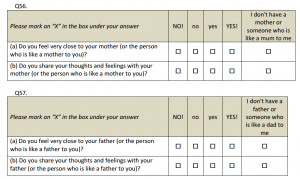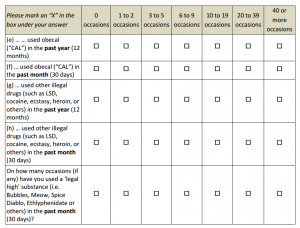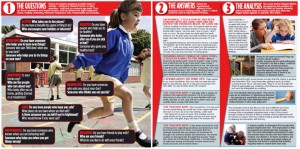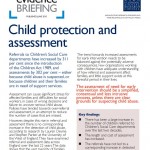Blog
Keeping you up to date on the progress of the Named Person scheme and the NO2NP campaign.
Creepy questioning of kids
Posted 10 years agoDisclaimer: I’m about to ask you some ridiculous and inappropriate questions.
Cast your mind back to being nine years old. In the course of that year, how many cars did you steal? How many times were you arrested? On how many occasions did you use LSD, cocaine, ecstasy or heroin?
What about life as a 14-year-old. How many times had you been pregnant or got someone else pregnant? How many children had you given birth to or fathered? How often did you or your partner use a condom?
And what about your relationship with your parents. Did you feel close to your mum and dad? If you misbehaved, did they take away your TV privileges? Did anyone in your family ever argue or shout at each other?
Perth and Kinross Council asked all of these questions in a 2013 kids’ survey. As inappropriate as it may seem, school children were asked about their drinking habits, drug use, intimate sexual experiences and even family finances.
The survey (called Evidence2Success) wasn’t very popular with parents (see here, here and here).
See surveys in full:
Evidence2Success: 9 to 13-years-old
Evidence2Success: 14-years-old+
But rather than listening to concerns, and scrapping the survey format, a similar questionnaire (called ChildrenCount) was rolled out in Perth and Kinross, as well as in Renfrewshire, Angus, Dundee and North Ayrshire.
It included the following questions:
• When you have misbehaved do your parents listen to your side?
• How often do your parents tell you they’re proud of you for something you’ve done?
• Do you enjoy spending time with your father?
• How old were you when you first smoked cannabis?
• How many times in the past year have you sold illegal drugs?
As if that wasn’t bad enough, last month it was revealed that Scottish pupils will soon face new tests about their private lives. Children could be asked if they have a cosy home, whether their parents make them feel special, or who clothes them and cooks for them. All of their answers will be stored on a giant Government database.
As top social work consultant Maggie Melon said, the information could easily be “interpreted as evidence of child abuse or neglect”.
Aside from being grossly inappropriate and an obvious intrusion into private family life, the surveys are doubly concerning when viewed in the context of the impending introduction of a Named Person for every child, tasked with policing their ‘wellbeing’.
Parents should not be made to feel like their judgement is constantly under question. Nor should the state assume that it knows best.
Research: ‘Increased referrals did not see equivalent rise in child abuse detection’
Posted 11 years agoA recent study into child protection strategies revealed that a rise in referrals did not result in a matching rise in detected cases of child abuse.
Researchers from Bristol Law School at the University of the West of England (UWE) said they found a “311 percent increase in referrals over the 22 years studied, but no corresponding increase in the detection of child abuse”.
A UWE press release stated: “The results raise questions about the policy towards year on year increased referrals and the resultant pressure on social workers and Children’s Services Departments to make decisions about which cases should continue onto assessment and beyond, and which should not.”
One of the researchers, Dr Lauren Devine, said: “We can see that the mixing of referrals for support services with referrals for suspected child abuse is problematic. We recommend fewer low-level assessments and wider availability of universal support services.”
The evidence briefing, entitled ‘Child protection and assessment’, stated: “Assessment can cause significant stress for affected families and difficulties for social workers, in cases of wrong decisions and failure to uncover serious child abuse.”
It continued: “Policies have tended towards over-referral and assessment, in an attempt to reduce the number of cases that are missed.”
But according to the research, the growth in referrals has not seen a similar increase in the number of child abuse cases detected.
Commenting on the figures from the 22-year study of referrals in England, the evidence briefing explained: “The data shows that the vast majority of families simply need support services – and many families do not even reach the support threshold.
“There is increased pressure on agencies to refer children, but it’s not properly recognised by professionals working with families or by policymakers that the consequences for families of the referral can be negative.”
The researchers made a number of recommendations, including: “The assessment of need for early intervention should be a simplified, consensual and less intrusive process, unless there are clear grounds for suspecting child abuse.”
Sources:
Lawyers contribute to rethinking child protection strategy
Evidence Briefing: Child protection and assessment
NO2NP Roadshow review: Aberdeen & Irvine
Posted 11 years agoThe two latest outings of the popular NO2NP roadshow were in Aberdeen on 15th October and Irvine, North Ayrshire on 23rd October.
At the Aberdeen meeting, supporters heard from Liz Smith MSP, Young People spokesperson for the Scottish Conservatives. She described the named person policy as “slightly sinister” and argued that resources would be diverted away from the most vulnerable, hence defeating the purpose of the policy. She also said it was ridiculous that children aged over 16, who were recognised as adults, still required a named person.
Next up was Maggie Mellon, a consultant and writer on social work and children/family issues. She said that government shouldn’t get involved in parenting, and lamented a preoccupation with risk and safety.
The audience were also addressed by Lesley Scott, representing Tymes Trust, who work with children suffering from ME. She said it was unclear what will happen when parents and the authorities disagree and that it would be a “minefield” for parents who choose not to engage. She also explained that the threshold for intervention had been lowered from risk of significant harm to the ‘SHANARRI’ indicators.
In the chair for the evening was Dr Stuart Waiton, a sociologist from Abertay University, Dundee, who expressed his concern that children may go to their named person to complain about their parents and that the authority of parents and families could be undermined.
The meeting in Irvine was addressed by Glasgow-based community paediatrician, Dr Jenny Cunningham, who explained that every child in Scotland would be assessed through the ‘SHANARRI’ indicators and that the legislation would oblige all health, education and social work professionals to identify any deficiencies in parenting and to arrange intervention. She also spoke of her concern about the impact of the named person on family life and said that parents were intimidated by the idea.
The next talk was given by Anne Cannon, a Glasgow-based mother of five, who said her two main concerns with the named person policy were the negative impact it would have on the relationship between parents and state agencies, and the fact that it would fail the very people the policy is meant to help.
The meeting was also addressed by local man, Councillor Tom Marshall, who sits on North Ayrshire Council. He spoke about the appalling ‘ChildrenCount’ surveys which have been operating in North Ayrshire and outlined some of the questions being asked of youngsters.
The next stop for the NO2NP roadshow will be PERTH (Salutation Hotel) on 12th November at 7:30pm, followed by MONTROSE (Park Hotel) on 26th November at 7:30pm. We hope to see you there.
‘ChildrenCount’ surveys
Posted 11 years agoState schools in three areas of Scotland are currently in the process of implementing the controversial ‘ChildrenCount’ surveys. In Dundee and Angus the surveys are to run until 15th September, while in North Ayrshire they are scheduled to run between 29th September and 10th October.
The surveys ask children aged between 9 and 16 a range of intrusive and personal questions, some of which are age specific. Examples from some or all of the surveys include:
- Do you feel very close to your mother?
- When you have misbehaved do your parents listen to your side?
- How often do your parents tell you they’re proud of you for something you’ve done?
- Do you enjoy spending time with your father?
- How old were you when you first smoked cannabis?
- How many times in the past year have you sold illegal drugs?
At the end, the survey states:
‘Some of the questions in the survey may have raised some issues you are currently experiencing. Please tick the following box if you’d like help from your teacher’
Aside from being grossly inappropriate and an obvious intrusion into private family life, the surveys are doubly concerning when viewed in the context of the impending introduction of a named person for every child, tasked with policing their ‘wellbeing’.
NO2NP is therefore encouraging all concerned parents who have children in schools where the surveys are being conducted to ask to see the full survey before their children are asked to take it, and if necessary, ask that their children be allowed to opt out altogether on the basis that the surveys are meant to be entirely voluntary.
Please also alert other parents in these local authorities who may not be aware of the surveys or their content.
Full details of the surveys and their contents can be found on the website of Dartington, the company behind the surveys.
Kenneth Roy lifts lid on new child wellbeing surveys
Posted 12 years agoKenneth Roy, ex-BBC journalist and editor of Scottish Review, has lifted the lid on a worrying new child wellbeing survey doing the rounds in several local authorities, including Dundee City. In an explosive piece in Scottish Review entitled ‘We are sleepwalking into an authoritarian Scotland’, Roy draws the link between these surveys and the wider named person scheme. He writes:
“Parents in Dundee (as well as Angus and North Ayrshire) are being assured in an official letter that the questionnaire is part of an ‘exciting’ collaboration – everything has to be exciting these days – between the Scottish Government and ‘your local council’. Who could resist such an offer?…If, however, you are one of those pesky people in Dundee who don’t approve of your children confiding intimate details of their private lives, it won’t be all that simple to opt out.
“The letter goes on to explain that the information gathered in the ‘ChildrenCount Survey’ – note the exciting collaboration between two unrelated words – will be used to enable the authorities, national and local, to better plan public services. Sounds familiar? If you were a regular reader of this magazine last winter, you will remember our long campaign opposing ‘Evidence2Success’, a questionnaire circulated to children in Perth and Kinross schools…’Evidence2Sucess’ – a concept tainted by all the bad publicity…seems to have disappeared as a brand, but only to be replaced by ‘ChildrenCount’. From next Monday, children will be counting all over Dundee.
“This is not some innocuous local initiative. After the pilot in Perth and Kinross, it feels like the next stage in a grand plan: the creation of a massive national database backing up the present administration’s intention to have a ‘Named Person’ for every child in Scotland. The named persons will be public officials. They will assume the role of advisors and guides to our children, though only in office hours and not on bank holidays. The named persons will also require to have what is called ‘annual leave’. No doubt, however, the paperwork spewing out of ChildrenCount surveys will be their beach reading. In this intriguing new Scotland, where European directives are lightly ignored in the interests of contentment, the only people who will be explicitly forbidden from being named persons are the child’s own parents.”







